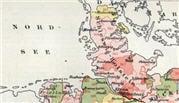Source Information

About East Frisia, Germany, Fire Insurance Registration, 1768-1937
About this collection
This collection contains fire insurance documents from East Frisia, Germany from 1768 up to and including 1937. The records are from the historic Ostfriesischen Landschaftlichen Brandkasse (Ostfriesland Fire Insurance Company) in Aurich. Aurich, "Auerk" in Low German, is the administrative center of the district of the same name in the German state of Lower Saxony. This city was once home to East Frisian princes, today it continues as an administrative center and home to numerous public officials. Since the 1990s, Aurich has also been the headquarters of a major manufacturer of wind turbines. Saint Lambert's Church is the jewell of Aurich's historic Old Town. The collection includes the cities of Aurich, Leer, Norden, Emden, Wittmund, Esens as well as the East Frisian Islands and numerous rural communities and offices (under their historical designations).
East Frisia became a province of Prussia in 1744. The Ostfriesischen Landschaftlichen Brandkasse (East Frisian Fire Insurance Company) was founded in 1754 by order of Fredrick the Great. The company was part of an effort to modernize government and provide a form of social protection to the rural population. Fire insurance was mandatory for all private residential and commercial buildings such as stables, barns, mills, factories, distilleries, breweries, sheep operations as well as for churches, towers, castles and nobility residences. Policyholders had to be at least 21 years of age and, as owners, often lived on the premises.
These extensive records preserve the social and economic history of East Friesland and are a valuable research tool for finding property owners and biographical information. The documents also illustrate the complicated political history of East Frisia. In 1806 it was annexed by the Kingdom Holland and later formed part of the French Empire. It was re-taken by Prussia in 1813 but ceded to the Kingdom of Hanover in 1815 which itself became part of Prussia in 1866.
What you can find in the records
The insurance policies were recorded on preprinted forms which were filled in by hand by employees of the insurance company. These records were bound into volumes in book form. They are organized according to office or locality and arranged by house number. The forms tracked policy details in columns, generally for 12 years. The following details may be found:
- Policyholder: Last Name, Given Names, - in some cases Marital Status, Maiden Name
- Change in policyholder, for example due to sale of inheritance
- Address: House number and, if already available, Road, District, Town, Village
- Building Name
- Term of Insurance
- Face Value, Changes to Value
Also recorded in this collection are settlement details for fires that actually occurred. These can be browsed under "Brandnachweise: Plattes Land" (covering 1806–1918) and "Brandnachweise: Städte und Flecken" (covering 1809–1923). They include the following details:
- Place and Claim Assessment
- Last Name and Given Names of the Policyholder
- Claim settlement details (for example, the value of materials destroyed and not destroyed, amounts paid out)
More about using this collection
Under "Browse this collection," select first the agency name, city, locality, historical region or category of records, then select the time period you want to browse. Where two volumes exist for the same year, they are suffixed with "A" and "B." When using the seach form, no search results will be returned if the policyholder was a community, a public entity or a parish as opposed to an individual.
 Need help with the German language? Find resources in our German Research Center.
Need help with the German language? Find resources in our German Research Center.